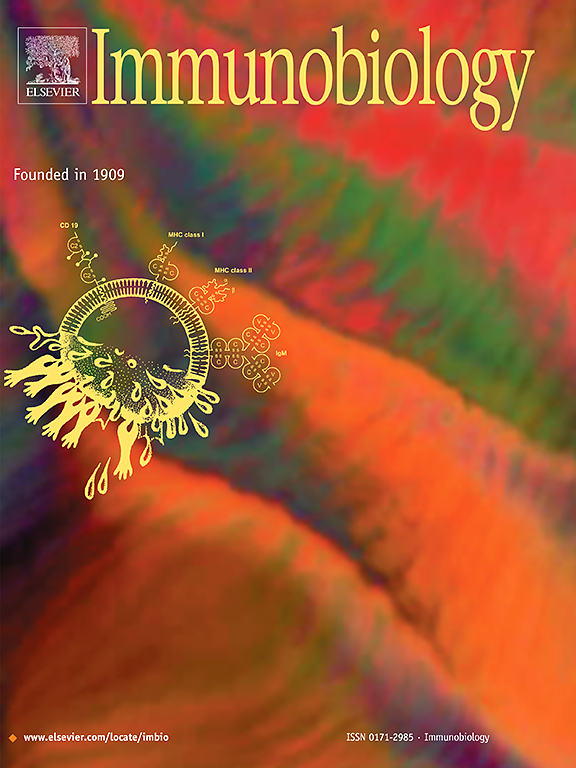sgp130Fc alleviates cartilage degeneration and knee osteoarthritis by inhibiting IL-6 trans-signaling pathway
IF 2.3
4区 医学
Q3 IMMUNOLOGY
引用次数: 0
Abstract
Background
Interleukin-6 (IL-6) trans-signaling plays a pivotal role in the pathogenesis and progression of osteoarthritis (OA), contributing to chronic intra-articular inflammation and cartilage degradation. Soluble gp130-Fc (sgp130Fc) is a selective inhibitor of IL-6 trans-signaling that spares classical signaling. This study aimed to elucidate the role of IL-6 trans-signaling in knee OA and evaluate the therapeutic potential of sgp130Fc.
Methods
Synovial fluid from OA patients at different disease stages was analyzed for IL-6, soluble IL-6 receptor (sIL-6R), and sgp130 levels by ELISA. Primary rat chondrocytes were treated with Hyper-IL-6 to activate IL-6 trans-signaling and co-treated with sgp130Fc to assess cell viability, gene expression, and lipid metabolism alterations. A rat OA model was established via the Hulth method, followed by intra-articular administration of sgp130Fc. Histological, immunohistochemical, and lipidomic analyses were performed to evaluate cartilage integrity and inflammatory responses.
Results
Levels of IL-6, sIL-6R, and sgp130 in synovial fluid increased with OA progression. Hyper-IL-6 impaired chondrocyte viability, activated JAK1-STAT3 signaling, promoted inflammatory and catabolic gene expression, and disrupted lipid metabolism, all of which were reversed by sgp130Fc treatment. In vivo, sgp130Fc injections alleviated cartilage degradation, reduced synovitis, suppressed inflammatory mediators, and restored lipid homeostasis.
Conclusions
Targeted inhibition of IL-6 trans-signaling with sgp130Fc effectively mitigates cartilage degeneration and inflammation in OA, highlighting its potential as a novel disease-modifying therapeutic strategy for knee osteoarthritis.
sgp130Fc通过抑制IL-6反式信号通路缓解软骨退变和膝关节骨关节炎。
背景:白细胞介素-6 (IL-6)反式信号在骨关节炎(OA)的发病和进展中起关键作用,导致慢性关节内炎症和软骨降解。可溶性gp130-Fc (sgp130Fc)是IL-6反式信号传导的选择性抑制剂,可避免经典信号传导。本研究旨在阐明IL-6反式信号在膝关节OA中的作用,并评估sgp130Fc的治疗潜力。方法:采用酶联免疫吸附法(ELISA)分析不同病程OA患者滑液中IL-6、可溶性IL-6受体(sIL-6R)和sgp130水平。用Hyper-IL-6处理原代大鼠软骨细胞以激活IL-6反式信号,并与sgp130Fc共处理以评估细胞活力、基因表达和脂质代谢改变。采用Hulth法建立大鼠骨性关节炎模型,然后关节内给药sgp130Fc。进行组织学、免疫组织化学和脂质组学分析以评估软骨完整性和炎症反应。结果:滑液中IL-6、sIL-6R和sgp130的水平随着OA的进展而升高。Hyper-IL-6损伤软骨细胞活力,激活JAK1-STAT3信号,促进炎症和分解代谢基因表达,破坏脂质代谢,所有这些都被sgp130Fc治疗逆转。在体内,注射sgp130Fc可缓解软骨退化,减轻滑膜炎,抑制炎症介质,恢复脂质稳态。结论:sgp130Fc靶向抑制IL-6反式信号传导可有效减轻OA患者的软骨退变和炎症,突显其作为膝关节骨关节炎一种新的疾病改善治疗策略的潜力。
本文章由计算机程序翻译,如有差异,请以英文原文为准。
求助全文
约1分钟内获得全文
求助全文
来源期刊

Immunobiology
医学-免疫学
CiteScore
5.00
自引率
3.60%
发文量
108
审稿时长
55 days
期刊介绍:
Immunobiology is a peer-reviewed journal that publishes highly innovative research approaches for a wide range of immunological subjects, including
• Innate Immunity,
• Adaptive Immunity,
• Complement Biology,
• Macrophage and Dendritic Cell Biology,
• Parasite Immunology,
• Tumour Immunology,
• Clinical Immunology,
• Immunogenetics,
• Immunotherapy and
• Immunopathology of infectious, allergic and autoimmune disease.
 求助内容:
求助内容: 应助结果提醒方式:
应助结果提醒方式:


